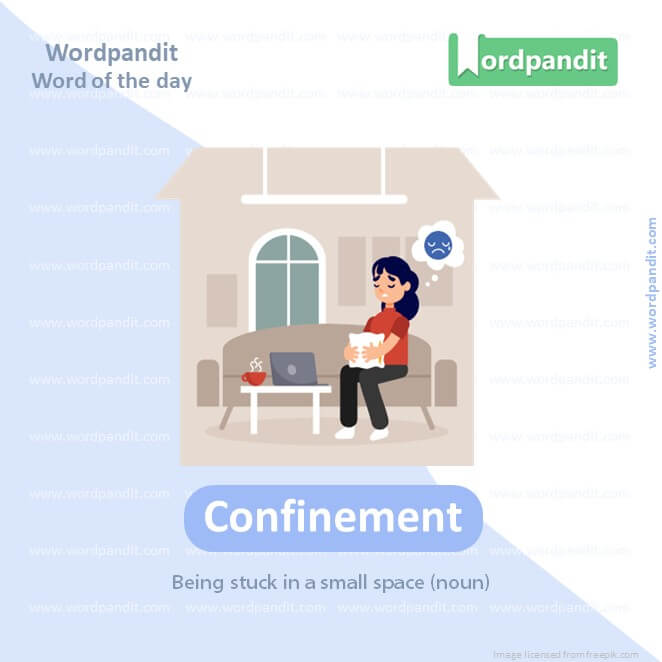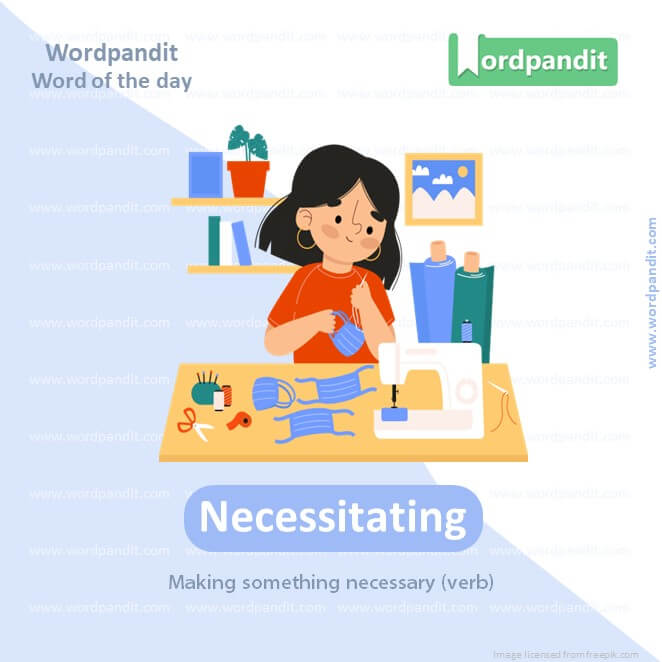Daily Vocabulary Words: List of Daily Used Words
Hi there. Welcome to this special section @ Wordpandit.
Our endeavour here is straightforward: highlighting important daily vocabulary words, you would encounter in The Hindu. This is your repository of commonly used words; essentially, we are posting a list of daily used words. Hence, this has significant practical application as it teaches you words that are commonly used in a leading publication such as The Hindu.
Visit the website daily to learn words from The Hindu.

WORD-1: Confinement
CONTEXT: the Court held that the word ‘custody’ does not necessarily mean detention or confinement.
SOURCE: The Hindu
EXPLANATORY PARAGRAPH: Confinement means when something or someone is kept in a small space and can’t move around freely. Imagine a bird in a cage; it’s confined because it can’t fly around like it would in the sky.
MEANING: Being stuck in a small space (noun).
PRONUNCIATION: kuhn-fahyn-muhnt
SYNONYMS: Restriction, captivity, limitation, imprisonment, enclosure, captivity
USAGE EXAMPLES:
1. The cat’s confinement in the cardboard box made it feel trapped.
2. During the rainy days, our confinement indoors led to boredom.
3. The soldier’s confinement in the barracks kept him safe from danger.
4. The zoo animals dislike their confinement in cages.

WORD-2: Necessitating
CONTEXT: first piece of evidence (whether substantive or corroborative), thereby necessitating arrest.
SOURCE: The Hindu
EXPLANATORY PARAGRAPH: Necessitating means something is making you do or have something because you really, really need it. Like when you have to wear a raincoat when it’s raining outside because it’s necessary to stay dry.
MEANING: Making something necessary (verb).
PRONUNCIATION: nuh-ses-i-tey-ting
SYNONYMS: Requiring, demanding, compelling, needing, calling for, obliging
USAGE EXAMPLES:
1. The cold weather necessitated wearing a warm jacket.
2. His poor health necessitated regular visits to the doctor.
3. The broken car necessitated a trip to the mechanic.
4. The heavy rain necessitated the use of an umbrella.

WORD-3: Pursuant
CONTEXT: the very basis of facts deposed by an accused in custody is voluntary and pursuant to discovery taking place.
SOURCE: The Hindu
EXPLANATORY PARAGRAPH: Pursuant means when you do something because it’s what a rule or plan says you should do. It’s like following the rules in a game; you do certain things because the game says so.
MEANING: In accordance with a rule or plan (adjective).
PRONUNCIATION: per-soo-uhnt
SYNONYMS: In compliance with, following, in accordance with, as per, in keeping with, as directed by
USAGE EXAMPLES:
1. The students acted pursuant to the school’s code of conduct.
2. She completed her work pursuant to the instructions given by her teacher.
3. The company made changes pursuant to the new regulations.
4. He followed the recipe pursuant to the instructions on the box

WORD-4: Delimitation
CONTEXT: the delimitation of constituencies to the fore. Is the south being punished for its success
SOURCE: The Hindu
EXPLANATORY PARAGRAPH: Delimitation is like drawing a line or a border around something to show where it begins and ends. It helps us see the exact area of something, like coloring inside the lines in a coloring book.
MEANING: Setting boundaries or limits (noun).
PRONUNCIATION: dih-lim-i-tey-shuhn
SYNONYMS: Boundary, demarcation, limitation, definition, restriction, border
USAGE EXAMPLES:
1. The delimitation of the property lines prevented disputes between neighbors.
2. The delimitation of the park’s boundaries was marked by a fence.
3. The delimitation of the project’s scope was crucial for its success.
4. They discussed the delimitation of their responsibilities in the group project.

WORD-5: Redistributive
CONTEXT: the redistributive transfers must be within certain limits. So, far the higher resource transfers to the backward States have not produced the expected improvement
SOURCE: The Hindu
EXPLANATORY PARAGRAPH: Redistributive means taking something from one place or person and giving it to someone else so that everything is more fair. It’s like sharing toys with your friends to make sure everyone has some to play with.
MEANING: Sharing or moving things to make them fair for everyone (adjective).
PRONUNCIATION: ree-di-struh-byoo-tiv
SYNONYMS: Equitable, fair, evenhanded, just, re-distributive, fair-minded
USAGE EXAMPLES:
1. The government’s redistributive policies aimed to reduce income inequality.
2. The teacher used a redistributive approach to ensure all students had access to resources.
3. The charity organization’s mission was to be redistributive, helping those in need.
4. The team decided on a redistributive allocation of tasks to ensure fairness.
WORD-6: Proactive
CONTEXT: I think we need a more proactive attitude. We need to identify the points where intervention is required so that the union does not veer towards an unbalanced and disastrous course of development or move in a direction which could lead to fragmentation.
SOURCE: The Hindu
EXPLANATORY PARAGRAPH: Being proactive means not waiting for problems to happen but doing things ahead of time to stop them from happening. It’s like wearing a helmet before riding your bike to be safe instead of waiting for an accident.
MEANING: Taking action before problems come up (adjective).
PRONUNCIATION: proh-ak-tiv
SYNONYMS: Preemptive, preventative, anticipatory, forward-thinking, self-starting, vigilant
USAGE EXAMPLES:
1. She took a proactive approach to her health by eating well and exercising.
2. The company implemented proactive measures to prevent data breaches.
3. Being proactive in studying helps you prepare for exams.
4. A proactive attitude can help you solve problems before they get worse.
WORD-7: Eradicating
CONTEXT: the Grameen Bank played a pivotal role in eradicating poverty through microlending. More than 100 nations have sought to replicate this model.
SOURCE: The Hindu
EXPLANATORY PARAGRAPH: Eradicating means getting rid of something completely, like making it disappear. It’s like magic, but in real life, when you remove something completely.
MEANING: Completely removing or wiping out something (verb).
PRONUNCIATION: ih-rad-i-keyt-ing
SYNONYMS: Eliminating, annihilating, exterminating, obliterating, destroying, wiping out
USAGE EXAMPLES:
1. The doctor focused on eradicating the virus from the patient’s body.
2. The gardener was successful in eradicating the invasive weeds.
3. The government launched a campaign aimed at eradicating poverty.
4. The superhero’s mission was eradicating crime from the city.
WORD-8: Overindebtedness
CONTEXT: Critics cite modest benefits associated with microcredit, overindebtedness, and a trend toward commercialisation that is less focused on serving the poor.
SOURCE: The Hindu
EXPLANATORY PARAGRAPH: Overindebtedness means having too much money borrowed, like owing too many cookies to your friend. It’s when you have more debt than you can handle.
MEANING: Having too much debt or owing too much money (noun).
PRONUNCIATION: oh-ver-in-debt-ed-ness
SYNONYMS: Excessive debt, financial burden, heavy indebtedness, overborrowing
USAGE EXAMPLES:
1. Their overindebtedness led to financial stress and worry.
2. The family’s overindebtedness resulted from overspending.
3. Overindebtedness can make it difficult to achieve financial goals.
4. They sought financial advice to address their overindebtedness.
WORD-9: Embroiled
CONTEXT: Mr. Yunus became embroiled in a barrage of legal cases. In 2011, he was removed by Bangladesh’s central bank from the post of managing director at the world’s best-known microlender, for holding on to the post past his retirement age.
SOURCE: The Hindu
EXPLANATORY PARAGRAPH: When someone is embroiled, it means they are stuck in a big mess or a problem, like being in the middle of a tangled knot. Imagine trying to untangle a bunch of yarn; it’s tricky!
MEANING: Involved in a complicated or messy situation (adjective).
PRONUNCIATION: em-broild
SYNONYMS: Entangled, ensnared, mired, involved, caught up, implicated
USAGE EXAMPLES:
1. The siblings became embroiled in an argument over a toy.
2. The company was embroiled in a legal dispute with its competitor.
3. He found himself embroiled in a misunderstanding with his friends.
4. The detective became embroiled in a complex case.
WORD-10: Unprecedented
CONTEXT: where there has been an unprecedented resurgence of Hindutva politics in the heartland.
SOURCE: The Hindu
EXPLANATORY PARAGRAPH: Unprecedented means something has never happened before, like a brand new surprise that no one has ever seen. It’s like finding a dinosaur in your backyard when nobody has ever found one there before!
MEANING: Something that has never happened before (adjective).
PRONUNCIATION: uhn-pres-i-den-ted
SYNONYMS: Unparalleled, exceptional, unique, incomparable, extraordinary, unmatched
USAGE EXAMPLES:
1. The storm brought unprecedented levels of rainfall to the area.
2. The discovery of the ancient ruins was unprecedented in their town’s history.
3. Her achievement in the competition was unprecedented for someone her age.
4. The company’s growth over the past year was unprecedented.
vocabulary journal
Are you seeking ways to elevate your language skills? Consider diving into a vocabulary journal. This method has proven instrumental in learning and grasping new words. The benefits of maintaining a vocabulary journal are far-reaching, aiding students, writers, and language enthusiasts alike.
A vocabulary journal is a personal tool that pushes you to explore the depths of language beyond surface understanding. It doesn’t demand any complex skills; all you need is consistency, interest, and a willingness to learn. This simple, yet efficient, method aids you in enriching your language abilities by creating a personalized resource of words that you encounter and learn every day.
How exactly do you learn from a vocabulary journal? It starts from the moment you encounter a new word. Don’t just gloss over it. Instead, jot it down in your journal. With this, your vocabulary journal becomes a growing garden of words, where every new addition sprouts the opportunity for more profound knowledge. Following this method encourages self-education, as it fosters independent research into the meaning, synonyms, antonyms, and uses of the new word.
Moreover, a vocabulary journal is not meant for one-time usage. Regularly revisit your notes and try to use the words in your daily conversations or writings. Over time, these fresh words will naturally weave themselves into your lexicon, refining your language skills.
Being able to articulate your thoughts precisely is an empowering skill. A vocabulary journal is a pathway towards achieving this feat. No matter your current language capabilities, initiating and maintaining a vocabulary journal continues to be a worthwhile endeavor.
Enhancing your language skills with a vocabulary journal is synonymous with building a bridge between learning and understanding. Journey through the vast landscapes of language with a vocabulary journal in tow and discover the joy of never running out of words.











